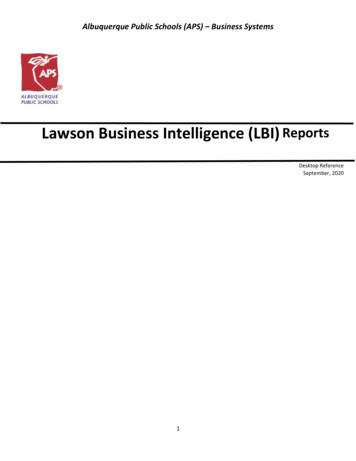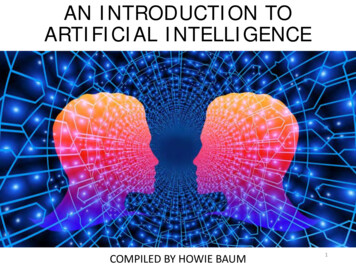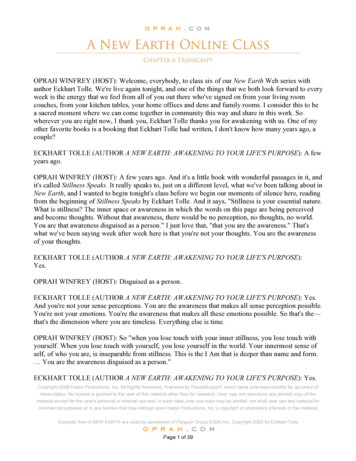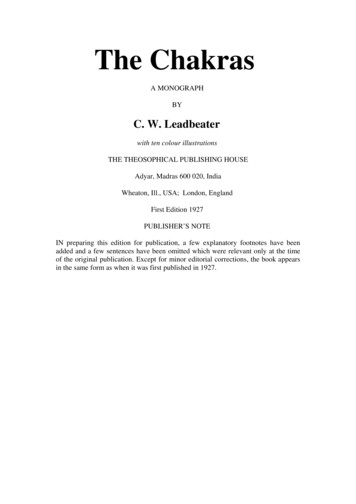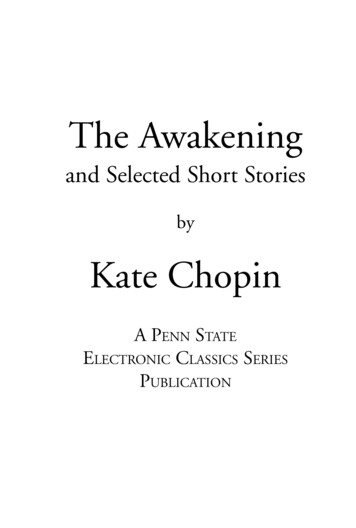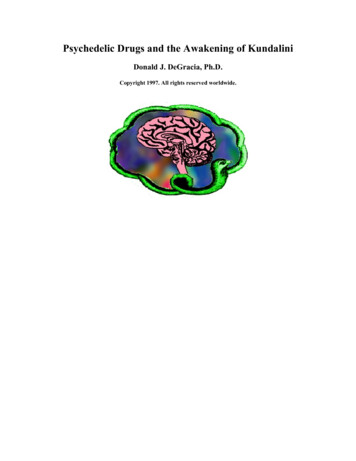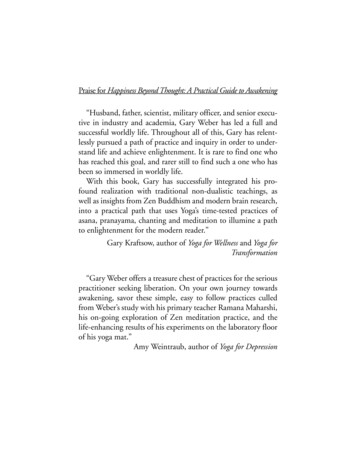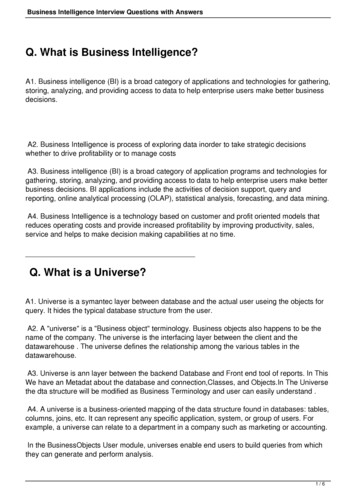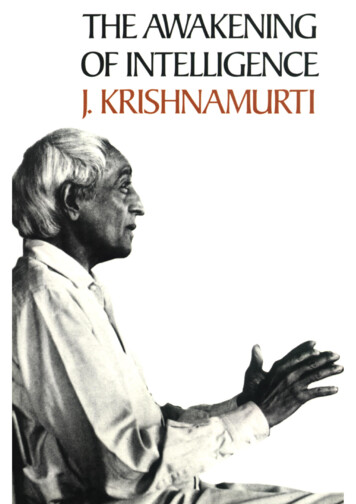
Transcription
The Awakening of IntelligenceCopyright 1973 by Krishnamurti Foundation Trust Ltd.
J. KRISHNAMURTITHE AWAKENING OFINTELLIGENCE
QUOTATIONS“Intelligence is not personal, is not the outcome of argument, belief, opinionor reason. Intelligence comes into being when the brain discovers its fallibility,when it discovers what it is capable of, and what it is not. Now what is therelationship of intelligence with this new dimension? . The different dimensioncan only operate through intelligence: if there is not that intelligence it cannotoperate. So in daily life it can only operate where intelligence is functioning”—Part VIII.“When (thought) sees that it is incapable of discovering something new, thatvery perception is the seed of intelligence, isn’t it? That is intelligence: ‘I cannotdo’. I thought I could do a lot of things, and I can in a certain direction, but in atotally new direction I cannot do anything. The discovery of that isintelligence”—Part VIII.“Thought is of time, intelligence is not of time. Intelligence isimmeasurable”—Part VII.“Intelligence comes into being when the mind, the heart and the body arereally harmonious”—Part VIII.“Is there the awakening of that intelligence? If there is . then it will operate,then you don’t have to say, ‘What am I to do?’ Perhaps there have been athousand persons here during these three weeks who have listened. If they reallylive that, do you know what’s going to happen? We should change the world”—Part VIII.“When there is that supreme energy, which is intelligence, is there death?”—Part VII.
EDITOR’S NOTEFor many years J. Krishnamurti spoke to audiences of all sorts, as well as toindividuals and to smaller groups, in America, Europe and India. This book wasplanned to indicate the wide range of his teaching and discussions. As the Talkswere always extempore, with interchange of question and answer, the reportsprinted here were taken from tapes, so that the exact words and phrases wereaccurately recorded. They have been edited sufficiently to present a readablepage, with some elimination of redundancies.Several of the themes in these chapters are taken up in a different way inConversations with four notable people interested in Krishnamurti’s ideas. Thesepersonal interviews are also reported from tapes recorded at the time.A word should be said about the Dialogues and the small group Discussion inChapter 10. The Dialogues are not discussions in the sense of debates orarguments, but are free exchanges between people with a common aim who areintent on understanding together with Krishnamurti fundamental problems. Forinstance, the five Dialogues at Saanen follow a series of seven Talks andcontinue the themes there initiated, clarifying or probing the issues further. It wasat Saanen, Switzerland, for many years, that people gathered from all over theworld to share some weeks with Krishnamurti.The small group Discussion (Chapter 10) took place at Brockwood Park inHampshire, England, where there is an educational centre and school for youngpeople founded by Krishnamurti. This discussion was with people for the mostpart long connected with Krishnamurti in his work.We are indebted to a number of helpers in the recording, transcribing andediting of this book.George and Cornelia Wingfield Digby
CONTENTSAMERICAPart ITwo Conversations: J. Krishnamurti and Professor Jacob Needleman1 T HE ROLE OF THE TEACHER2 O N INNER SPACE ; ON TRADITION AND DEPENDENCEPart IIThree Talks in New York City1 I NNER REVOLUTIONThe need to change. A process in time or instantaneous? The consciousand the unconscious; dreams. The analytical process. To see the content ofconsciousness without the separation of observer and observed. Noise andresistance. “When there is complete cessation of division between theobserver and the observed, then ‘what is’ is no longer what is.”QUESTIONS: Observer and observed; fragmentation; resistance.2 R ELATIONSHIPRelationship. “You are the world.” The separate self; corruption. To seewhat actually “is”. What love is not. “We have no passion; we have lust,we have pleasure.” To understand what death is. Love is its own eternity.QUESTIONS: The concept of good and bad; sharing; pain and fear; how tobe free of the past?3 R ELIGIOUS EXPERIENCE . M EDITATIONIs there a religious experience? Search for truth; the meaning of search.“What is a religious mind?” “What is the quality of mind which is nolonger experiencing?” Discipline; virtue; order. Meditation is not anescape. The function of knowledge and freedom from the known.“Meditation is to find out if there is a field not already contaminated bythe known.” “The first step is the last step.”QUESTIONS: The analogy of dirt; awareness; consciousness; love;psychological time.Part IIITwo Conversations: J. Krishnamurti and Alain Naudé1 T HE CIRCUS OF MAN ’ S STRUGGLE2 O N GOOD AND EVIL
INDIAPart IVTwo Conversations: Krishnamurti and Swami Venkatesananda1 The guru and search. Four schools of Yoga scrutinized (Karma, Bhakti,Raja, Gnana Yoga).2 Four “mahavakyas” from the Upanishads discussed. Communication andthe Bodhisattva ideal. Vedanta and the ending of knowledge.Part VThree Talks in Madras1 T HE ART OF SEEINGTo see, not partially but totally. “The act of seeing is the only truth.” Ofthe vast mind only a fragment is used. The fragmentary influence ofculture, tradition. “Living in a little corner of a distorted field.” “Youcannot understand through a fragment.” Freedom from “the little corner”.The beauty of seeing.2 F REEDOMTo share a free mind. “If we could come upon this, it is really amysterious flower.” Why has man not got this thing? Fear. “Living” is notliving. Words taken for substance. Wastage of energy. “The mature mindhas no comparison . no measure.” The validity of “the life that you leadevery day . without understanding it you will never understand love,beauty, or death”. Through negation, that thing which alone is the positivecomes into being.3 T HE S ACREDPloughing, never sowing. Ideation. Sensitivity lacking in daily life.Attention and intelligence. Disorder in ourselves and the world: ourresponsibility. The question of seeing. Images and direct contact. Thesacred. “When you have that love you can put away all your sacredbooks.”Part VIFour Dialogues in Madras1 C ONFLICTImages: are we aware that we see through images? Concepts; the gapbetween concepts and daily living; resulting conflict. “To get illuminationyou must be able to look.” “To live without conflict, but not to go tosleep.”
2 T HE PURSUIT OF PLEASURESelf-interest and self-dedication. Demand for satisfaction. Levels ofgratification. Has psychological gratification any meaning? “A whirlpoolof mischief and misery inwardly.” Aggression. Pursuit of pleasure. “Thereare no roots of heaven in pleasure—there are only roots of indifferenceand pain.” Watching is its own discipline.3 T IME , SPACE AND THE CENTREThe ideal, the concept, and “what is”. Need to understand suffering: pain,loneliness, fear, envy. The ego-centre. The space and time of the centre. Isit possible not to have an ego-centre and yet live in this world? “We livewithin the prison of our own thinking.” To see the structure of the centre.To look without the centre.4 A FUNDAMENTAL QUESTIONWhat is clear thinking in relation to daily living? Meeting the present withthe past. How to live with memory and technological knowledge and yetbe free of the past? Double life: temple, office. How to live withoutfragmentation?—to answer from a concept is further fragmentation.Silence before the immensity of a fundamental question. “Can you live socompletely that there is only the active present now?”EUROPEPart VIISeven Talks in Saanen, Switzerland1 W HAT IS YOUR OVERRIDING INTEREST ?Passion and intensity needed. The inner and outer: can they be divided?QUESTIONS: Pleasure and interest; God; children and education; manydifferent interests; the meaning of demonstrations; of love, truth and order.2 O RDERThe mind only knows disorder. The state of “not-knowing”. The “self” ispart of the culture, which is disorder.QUESTIONS: Is the mind capable of looking? Analysis; the guru:relationship with Krishnamurti; can you look at yourself?3 C AN WE UNDERSTAND OURSELVES ?The problem of self-knowledge is the problem of looking. To lookwithout fragmentation, without the “me”. Analysis, dreams and sleep. Theproblem of the “observer” and of time. “When you look at yourselfwithout the eyes of time, who is there to look?”QUESTIONS: Are some images necessary? Is evaluation vitiated by ourstate of confusion? Conflict.
4 L ONELINESSPreoccupation with oneself. Relationship. Action in relationship and dailylife. Images isolate: the understanding of image-building. “Self-concern ismy major image.” Relationship without conflict means love.QUESTIONS: Can the self have unmotivated passion? Images; drugs andstimulants.5 T HOUGHT AND THE IMMEASURABLECan thought solve our problems? The function of thought. The field ofthought and its projections. Can the mind enter into the immeasurable?What is the factor of illusion? Physical and mental fear and escapes. Themind that is constantly learning.QUESTIONS: Can one observe without judgment and evaluation? Isperception seeing something totally? Can words be used to describe a nonverbal state?6 T HE ACTION OF WILL AND THE ENERGY NEEDED FOR RADICALCHANGEGreat energy needed; its wastage. Will is resistance. Will as assertion ofthe “me”. Is there action without choice, which is not motivated? “To lookwith eyes that are not conditioned.” Choiceless awareness of conditioning.To see and reject the falseness. What love is not. To face the question ofdeath. “The ending of energy as the ‘me’ is the capacity to look at death.”Energy to look at the unknown: supreme energy is intelligence.QUESTIONS: We understand intellectually, but can’t live it; is a mancapable? How to listen? Are not feelings and emotions the cause ofviolence?7 T HOUGHT , INTELLIGENCE , AND THE IMMEASURABLEDifferent meanings of space. The space we think and act from; the spacethat thought has built. How is one to have immeasurable space? “To carryour burden and yet to seek freedom.” Thought which does not divide itselfis moving in experiencing. The meaning of intelligence. Harmony: mind,heart and organism. “Thought is of time, intelligence is not of time.”Intelligence and the immeasurable.QUESTIONS: Hatha Yoga. Is there separation of observer and observed intechnological work? Awareness and sleep.Part VIIIFive Dialogues in Saanen1 T HE FRAGMENTATION OF CONSCIOUSNESSAre we aware that we look at life fragmentarily? The conditioning ofconsciousness. Do we really know its content? Is there a division intoconscious and unconscious? The observer is part of the content of
consciousness. Is there any agent outside this conditioned content? “TricksI play upon myself.” What is action? Since the self is fragmented, “I”cannot see life as a totality.2 I S INTELLIGENCE AWAKE ?What is the relationship between intelligence and thought? The limitationsof conditioned thinking. No new movement can take place if the “oldbrain” is constantly in operation. “I have been going South, thinking I wasgoing North.” The perception of the limitations of the old is the seed ofintelligence. Is the “new” recognizable? The different dimension can onlyoperate through intelligence.3 F EARThe link between pleasure and fear; the role of thought. Thought cannotreduce the uncertain unknown to terms of knowledge. Need to see thestructure of fear. Psychologically, tomorrow may not exist. What does,“To live wholly in the present” imply?4 F EAR , TIME AND THE IMAGEChronological and psychological time. The dilemma of knowledge. Thedilemma of thought and the image. Can one find the root of fear? “Themind that can never be hurt.”5 I NTELLIGENCE AND THE RELIGIOUS LIFEWhat is a religious life? Relationship between meditation and the quietmind. Thought as measure; the action of measurement. How can theimmeasurable be understood? Intelligence as the relationship between themeasurable and the immeasurable. The awakening of intelligence.Choiceless awareness. Learning, not accumulating knowledge.ENGLANDPart IXTwo Talks at Brockwood1 T HE RELATIONSHIP TO AWARENESS OF THOUGHT AND THE IMAGEThe uses and limitations of thought. Images: the authority of the image.“The more sensitive one is, the greater the burden of images.” Analysisand images. Psychological order; causes of disorder: opinion, comparison,images. Possible dissolution of images. Formation of images. Attentionand inattention. “It is only when the mind is inattentive that the image isformed.” Attention and harmony: mind, heart, body.
2 T HE MEDITATIVE MIND AND THE IMPOSSIBLE QUESTION“Meditation is the total release of energy.” Western world built onmeasurement, which is maya for the East. Schools of meditation useless.Energy depends on self-knowledge. Problem of self-observation. To look“without the eyes of the past”. Naming. The hidden in oneself. Drugs. Thehidden content and the impossible question. “Meditation is a way ofputting aside altogether everything that man has conceived of himself andthe world.” A radical revolution in one affects the whole world. Whattakes place when the mind is quiet? “Meditation is . seeing the measureand going beyond the measure.” Harmony and a “totally different life”.QUESTIONS: Intuition; awareness; awareness and sleep; teacher anddisciple.Part XA Discussion with a small group at BrockwoodV IOLENCE AND THE “ ME ”Does change imply violence? To what extent do we reject violence?Violence and energy: observing violence. What is the root of violence?Understanding the “me”; the “me” that wants to change is violent. Doesthe “me” or intelligence see? The implications of seeing.Part XIConversation: J. Krishnamurti and Professor David BohmO N INTELLIGENCEThought is of the order of time; intelligence is of a different order,different quality. Is intelligence related to thought? Brain the instrument ofintelligence; thought as a pointer. Thought, not intelligence, dominates theworld.Problem of thought and the awakening of intelligence. Intelligenceoperating in a limited framework can serve highly unintelligent purposes.Matter, thought, intelligence have a common source, are one energy; whydid it divide? Security and survival: thought cannot consider deathproperly.“Can the mind keep the purity of the original source?” Problem of thequietening of thought. Insight, the perception of the whole, is necessary.Communication without the interference of the conscious mind.
AMERICAITwo Conversations:J. Krishnamurti and Professor Jacob Needleman1 The role of the teacher2 On inner space; on tradition and dependence
1THE ROLE OF THE TEACHERConversation between J. Krishnamurtiand Professor J. NeedlemanNeedleman: 1 There is much talk of a spiritual revolution among young people,particularly here in California. Do you see in this very mixed phenomenon anyhope of a new flowering for modern civilization, a new possibility of growth?KRISHNAMURTI: For a new possibility of growth, don’t you think, Sir, that onehas to be rather serious, and not merely jump from one spectacular amusement toanother? If one has looked at all the religions of the world and seen theirorganized futility, and out of that perception seen something real and clear,perhaps then there could be something new in California, or in the world. But asfar as I have seen, I am afraid there is not a quality of seriousness in all this. Imay be mistaken, because I see only these so-called young people in the distance,among the audience, and occasionally here; and by their questions, by theirlaughter, by their applause, they don’t strike me as being very serious, mature,with great intent. I may be mistaken, naturally.Needleman: I understand what you are saying. My question only is: perhaps wecan’t very well expect young people to be serious.KRISHNAMURTI: That is why I don’t think it is applicable to the young people. Idon’t know why one has made such an extraordinary thing out of young people,why it has become such an important thing. In a few years they will be the oldpeople in their turn.Needleman: As a phenomenon, apart from what is underneath it all, this interestin transcending experience—or whatever one wants to call it—seems to be a kindof seed-ground from which certain unusual people aside from all the phoneynessand all the deceivers, certain Masters perhaps, may spring up.K RISHNAMURTI : But I am not sure, Sir, that all the deceivers and exploiters arenot covering this up. “Krishna-consciousness” and Transcendental Meditationand all this nonsense that is going on—they are caught in all that. It is a form ofexhibitionism, a form of amusement and entertainment. For something new totake place there must be a nucleus of really devoted, serious people, who go1Jacob Needleman is Professor of philosophy at San Francisco State College; author of The NewReligions, and editor of the Penguin Metaphysical Library.
through to the very end. After going through all these things, they say, “Here issomething I am going to pursue to the end.”Needleman: A serious person would be someone who would have to becomedisillusioned with everything else.KRISHNAMURTI: I would not call it disillusioned but a form of seriousness.Needleman: But a precondition for it?KRISHNAMURTI: No, I wouldn’t call it disillusionment at all, that leads to despairand cynicism. I mean the examination of all the things that are so-calledreligious, so-called spiritual: to examine, to find out what is the truth in all this,whether there is any truth in it. Or to discard the whole thing and start anew, andnot go through all the trappings, all the mess of it.Needleman: I think that is what I tried to say, but this expresses it better. Peoplewho have tried something and it has failed for them.KRISHNAMURTI: Not “other people”. I mean one has to discard all the promises,all the experiences, all the mystical assertions. I think one has to start as thoughone knew absolutely nothing.Needleman: That is very hard.KRISHNAMURTI: No, Sir, I don’t think that is hard. I think it is hard only for thosepeople who have filled themselves with other people’s knowledge.Needleman: Isn’t that most of us? I was speaking to my class yesterday at SanFrancisco State, and I said I was going to interview Krishnamurti and whatquestion would you like me to ask him. They had many questions, but the onethat touched me most was what one young man said: “I have read his books overand over again and I can’t do what he says.” There was something so clear aboutthat, it rang a bell. It seems in a certain subtle sense to begin in this way. To be abeginner, fresh!KRISHNAMURTI: I don’t think that we question enough. Do you know what Imean?Needleman: Yes.KRISHNAMURTI: We accept, we are gullible, we are greedy for new experiences.People swallow what is said by anybody with a beard, with promises, saying youwill have a marvellous experience if you do certain things! I think one has to say:“I know nothing.” Obviously I can’t rely on others. If there were no books, nogurus, what would you do?
Needleman: But one is so easily deceived.KRISHNAMURTI: You are deceived when you want something.Needleman: Yes, I understand that.KRISHNAMURTI: So you say, “I am going to find out, I am going to enquire stepby step. I don’t want to deceive myself.” Deception arises when I want, when Iam greedy, when I say, “All experience is shallow, I want somethingmysterious”—then I am caught.Needleman: To me you are speaking about a state, an attitude, an approach,which is itself very far along in understanding for a man. I feel very far from thatmyself, and I know my students do. And so they feel, rightly or wrongly, a needfor help. They probably misunderstand what help is, but is there such a thing ashelp?KRISHNAMURTI: Would you say: “Why do you ask for help?”Needleman: Let me put it like this. You sort of smell yourself deceiving yourself,you don’t exactly know.KRISHNAMURTI: It is fairly simple. I don’t want to deceive myself—right? So Ifind out what is the movement, what is the thing that brings deception. Obviouslyit is when I am greedy, when I want something, when I am dissatisfied. Soinstead of attacking greed, want, dissatisfaction, I want something more.Needleman: Yes.KRISHNAMURTI: So I have to understand my greed. What am I greedy for? Is itbecause I am fed up with this world, I have had women, I have had cars, I havehad money and I want something more?Needleman: I think one is greedy because one desires stimulation, to be taken outof oneself, so that one doesn’t see the poverty of oneself. But what I am trying toask—I know you have answered this question many times in your talks, but itkeeps recurring, almost unavoidably—the great traditions of the world, asidefrom what has become of them (they have become distorted and misinterpretedand deceptive) always speak directly or indirectly of help. They say “The guru isyourself too”, but at the same time there is help.KRISHNAMURTI: Sir, you know what that word “guru” means?Needleman: No, not exactly.
KRISHNAMURTI: The one who points. That is one meaning. Another meaning isthe one who brings enlightenment, lifts your burden. But instead of lifting yourburden they impose their burden on you.Needleman: I am afraid so.KRISHNAMURTI: Guru also means one who helps you to cross over—and so on,there are various meanings. The moment the guru says he knows, then you maybe sure he doesn’t know. Because what he knows is something past, obviously.Knowledge is the past. And when he says he knows, he is thinking of someexperience which he has had, which he has been able to recognize as somethinggreat, and that recognition is born out of his previous knowledge, otherwise hecouldn’t recognize it, and therefore his experience has its roots in the past.Therefore it is not real.Needleman: Well, I think that most knowledge is that.KRISHNAMURTI: So why do we want any form of ancient or modern tradition inall this? Look, Sir, I don’t read any religious, philosophical, psychological books:one can go into oneself at tremendous depths and find out everything. To go intooneself is the problem, how to do it. Not being able to do it one asks, “Wouldyou please help me?”Needleman: Yes.KRISHNAMURTI: And the other fellow says, “I’ll help you” and pushes you offsomewhere else.Needleman: Well, it sort of answers the question. I was reading a book the otherday which spoke of something called “Sat-san”.KRISHNAMURTI: Do you know what it means?Needleman: Association with the wise.KRISHNAMURTI: No, with good people.Needleman: With good people, Ah!KRISHNAMURTI: Being good you are wise. Not, being wise you are good.Needleman: I understand that.KRISHNAMURTI: Because you are good, you are wise.
Needleman: I am not trying to pin this down to something, but I find my studentsand I myself, speaking for myself, when we read, when we hear you, we say,“Ah! I need no one, I need to be with no one”—and there is a tremendousdeception in this too.KRISHNAMURTI: Naturally, because you are being influenced by the speaker.Needleman: Yes. That is true. (Laughter.)KRISHNAMURTI: Sir, look, let’s be very simple. Suppose, if there were no book,no guru, no teacher, what would you do? One is in turmoil, confusion, agony,what would you do? With nobody to help you, no drugs, no tranquillizers, noorganized religions, what would you do?Needleman: I can’t imagine what I would do.KRISHNAMURTI: That’s it.Needleman: Perhaps there would be a moment of urgency there.KRISHNAMURTI: That’s it. We haven’t the urgency because we say, “Well,somebody is going to help me.”Needleman: But most people would be driven insane by that situation.KRISHNAMURTI: I am not sure, Sir.Needleman: I’m not sure either.KRISHNAMURTI: No, I am not at all sure. Because what have we done up to now?The people on whom we have relied, the religions, the churches, education, theyhave led us to this awful mess. We aren’t free of sorrow, we aren’t free of ourbeastliness, our ugliness, our vanities.Needleman: Can one say that of all of them? There are differences. For everythousand deceivers there is one Buddha.KRISHNAMURTI: But that is not my concern, Sir, if we say that it leads to suchdeception. No, no.Needleman: Then let me ask you this. We know that without hard work the bodymay get ill, and this hard work is what we call effort. Is there another effort forwhat we might call the spirit? You speak against effort, but does not the growthand well-being of all sides of man demand something like hard work of one sortor another?
KRISHNAMURTI: I wonder what you mean by hard work? Physical hard work?Needleman: That is what we usually mean by hard work. Or going againstdesires.KRISHNAMURTI: You see, there we are! Our conditioning, our culture, is builtaround this “going against”. Erecting a wall of resistance. So when we say “hardwork”, what do we mean? Laziness? Why have I to make an effort aboutanything? Why?Needleman: Because I wish for something.KRISHNAMURTI: No. Why is there this cult of effort? Why have I to make effortto reach God, enlightenment, truth?Needleman: There are many possible answers, but I can only answer for myself.KRISHNAMURTI: It may be just there, only I don’t know how to look.Needleman: But then there must be an obstacle.KRISHNAMURTI: How to look! It may be just round the comer, under the flower,it may be anywhere. So first I have to learn to look, not make an effort to look. Imust find out what it means to look.Needleman: Yes, but don’t you admit that there may be a resistance to thatlooking?KRISHNAMURTI: Then don’t bother to look! If somebody comes along and says,“I don’t want to look”, how are you going to force him to look?Needleman: No. I am speaking about myself now. I want to look.KRISHNAMURTI: If you want to look, what do you mean by looking? You mustfind out what it means to look before you make an effort to look. Right, Sir?Needleman: That would be, to me, an effort.KRISHNAMURTI: No.Needleman: To do it in that delicate, subtle way. I wish to look, but I don’t wishto find out what it means to look. I agree this is much more to me the basic thing.But this wish to do it quickly, to get it over, is this not resistance?KRISHNAMURTI: Quick medicine to get it over.
Needleman: Is there something in me that I have to study, that resists this subtle,much more delicate thing you are speaking about? Is this not work, what you aresaying? Isn’t it work to ask the question so quietly, so subtly? It seems to me it iswork to not listen to that part that wants to do it.KRISHNAMURTI: Quickly.Needleman: For us particularly in the West, or maybe for all men.KRISHNAMURTI: I am afraid it is all over the world the same. “Tell me how to getthere quickly.”Needleman: And yet you say it is in a moment.KRISHNAMURTI: It is, obviously.Needleman: Yes, I understand.KRISHNAMURTI: Sir, what is effort? To get out of bed in the morning, when youdon’t want to get up, is an effort. What brings on that laziness? Lack of sleep,overeating, overindulging and all the rest of it; and next morning you say, “Oh,what a bore, I have to get up!” Now wait a minute, Sir, follow it. What islaziness? Is it physical laziness, or is thought itself lazy?Needleman: That I don’t understand. I need another word. “Thought is lazy?” Ifind that thought is always the same.KRISHNAMURTI: No Sir. I am lazy, I don’t want to get up and so I force myself toget up. In that is so-called effort.Needleman: Yes.KRISHNAMURTI: I want that, but I shouldn’t have it, I resist it. The resistance iseffort. I get angry and I mustn’t be angry: resistance, effort. What has made melazy?Needleman: The thought that I ought to be getting up.KRISHNAMURTI: That’s it.Needleman: All right.KRISHNAMURTI: So I really have to go into this whole question of thought. Notmake out that the body is lazy, force the body out of bed, because the body hasits own intelligence, it knows when it is tired and should rest. This morning I wastired; I had prepared the mat and everything to do yoga exercises and the body
said “No, sorry”. And I said, “All right”. That is not laziness. The body said,“Leave me alone because you talked yesterday, you saw many people, you aretired.” Thought then says, “You must get up and do the exercises because it isgood for you, you have done it every day, it has become a habit, don’t relax, youwill get lazy, keep at it.” Which means: thought is making me lazy, not the bodyis making me lazy.Needleman: I understand that. So there is an effort with regard to thought.KRISHNAMURTI: So no effort! Why is thought so mechanical? And is all thoughtmechanical?Needleman: Yes, all right, one puts that question.KRISHNAMURTI: Isn’t it?Needleman: I can’t say that I have verified that.KRISHNAMURTI: But we can, Sir. That is fairly simple to see. Isn’t all thoughtmechanical? The non-mechanical state is the absence of thought; not the neglectof thought but the absence of it.Needleman: How can I find that out?KRISHNAMURTI: Do it now, it is simple enough. You can do it now if you wishto. Thought is mechanical.Needleman: Let’s assume that.KRISHNAMURTI: Not assume. Don’t assume anything.Needleman: All right.KRISHNAMURTI: Thought is mechanical, isn’t it?—because it is repetitive,conforming, comparing.Needleman: That part I see, the comparing. But my experience is that not allthought is of the same quality. There are qualities of thought.KRISHNAMURTI: Are there?Needleman: In my experience there are.KRISHNAMURTI: Let’s find out. What is thought, thinking?
Needleman: There seems to be thought that is very shallow, very repetitive, verymechanical, it has a certain taste to it. There seems to be another kind of thoughtwhich is connected more with my body, with my whole self, it resonates inanother way.KRISHNAMURTI: That is what, Sir? Thought is the response of memory.Needleman: All right, this is a definition.KRISHNAMURTI: No, no, I can
arguments, but are free exchanges between people with a common aim who are intent on understanding together with Krishnamurti fundamental problems. For instance, the five Dialogues at Saanen follow a series of seven Talks and continue the themes there in

